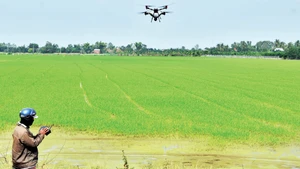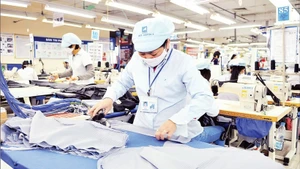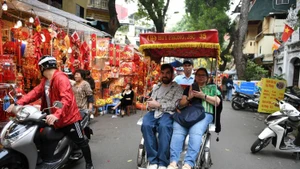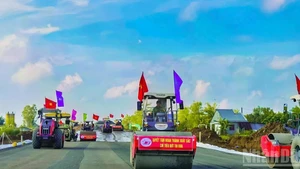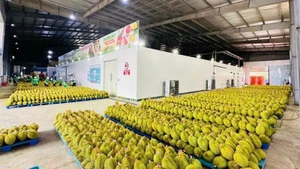Ready for growth
It is not by chance that internal exchanges between members of the Vietnam Family Business Council are always a matter of transfer. After more than 35 years of Doi Moi (Renewal), the generation of entrepreneurs bearing the mark of Vietnam's market economy has passed the most vigorous stage. Now it is imperative to consider the transfer plan.
But unlike many years ago, this problem is no longer too difficult, thanks to the emergence of the next generation of entrepreneurs.
“We believe that the next generation will bring stronger businesses, not only because of their trained knowledge base and market development trends but also because of their empathy and understanding of the career path and development of the previous generation of businesses,” explained the Chairman of the Vietnam Family Business Council Pham Dinh Doan.
Going back eight years ago, about 20 entrepreneurs, from north to south, proposed the establishment of the Vietnam Family Business Council. The main source is the need to prepare for the generation transfer process in enterprises. Because without early and cautious preparation, it will greatly affect the sustainable development of businesses. It took six years before the F2 Generation Entrepreneur Training School was also formed, by the F1 entrepreneurs themselves.
“The transfer issue in enterprises has not only been solved by us but, it has also been joined by the F2 generation. The transfer journey will therefore be much clearer,” said Pham Dinh Doan.
The transfer issue in family businesses has never ceased, not only in Vietnamese businesses but also in family businesses around the world. According to a study by Deloitte Private, a business problem turns into a family problem after 19 months, however, a family problem after just 14 months turns into a business problem.
However, family businesses around the world talk about passing generations to the F3, F4 and beyond. Meanwhile, Vietnamese businesses are still in the transition period between the generation of start-ups and the F2 generation - the children of business owners, who do not have much experience in this important job.
Even the Chairman of the technology company FPT Corporation Truong Gia Binh, once commented that with the development history of many peculiarities of the Vietnamese economy, how to deal with increasingly large assets in each family is not easy. With family businesses, it is quite difficult to find a solution.
Nurturing aspiration
“The Republic of Korea, with a population smaller than Vietnam, took less than 60 years to rise to the 10th position in the world. Vietnamese population is currently ranked 15th in the world. The goal we need to aim for is to bring our economy to this position, hopefully, while you and I are both alive”, Chairman of U&I Mai Huu Tin started a talk with young entrepreneurs in that way. Among these was his son, a member of the first class of the F2 Training School.
In 1993, when the Vietnamese youth business movement officially started, Vietnam ranked 67th in the world in terms of economic size. Currently, Vietnam’s position is the 41st. Generations of entrepreneurs over the years have contributed a significant part to this achievement, making Vietnam's position much higher, even though it started mostly from zero, from the aspiration to escape poverty.
Currently, Vietnam has nearly 900,000 operating businesses, about 14,400 cooperatives and about 5.1 million business households (of which about 1.6 million households have tax codes). Regarding business households with tax codes, the business contingent nationwide has nearly 4 million entrepreneurs and 7 million entrepreneurs, if counting business households without tax codes.
Many Vietnamese businesses and entrepreneurs have boldly made breakthroughs in production and business with ambitious projects, reaching out to the international market. In addition, several economic groups and private enterprises have appeared with large-scale, financial potential, and modern management and technology, pioneering in several important industries and fields, such as manufacturing and trading, automobile manufacturing, aviation, information technology, telecommunications, services, real estate, and agriculture.
Vietnam had six entrepreneurs at the top of the global “dollar billionaires” in 2021. Vietnam has 124 businesses, with 283 products bearing national brands, some brands have affirmed their value in regional and global markets.
But, to realise the goal of reaching 10th place in the world and completing industrialisation by 2030 and completing the first phase of modernisation by 2045, as expected by Chairman of U&I Mai Huu Tin, more dedication from the business community is required. Tin himself and many entrepreneurs believe that the entrepreneurial fire in each Vietnamese businessman is still being kept, lit and passed on to the next generations.
“Maximising one’s capacity is not only for personal wealth but also for the sake of all Vietnamese people. By doing so, one can be proud to be Vietnamese”, Tin confirmed.
In the current context, entrepreneurs have many conditions to realise that pride, from the increasingly open development space of the country to the trend of the world market with the revolution of science and technology. There are opportunities for the following economies to accelerate, accompany and surpass. The business community must cultivate ideals, aspirations and potential to turn goals into reality.









